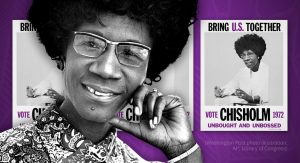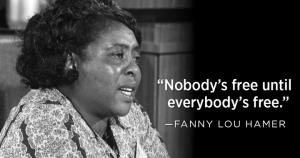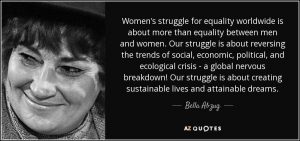Transfeminism
Speaking My Truth to Power
by Pauline Park
I am currently chair of the New York Association for Gender Rights Advocacy (NYAGRA) and president of the board of directors of Queens Pride House, an LGBT community center in the borough of Queens, and it was in the context of co-founding Queens Pride House that I first came out as an openly transgendered woman in 1997; it was through NYAGRA that I led the campaign for the transgender rights law enacted by the New York City Council in 2002. I was the only openly transgendered executive director of any community center in the state as well as the only Asian American when I served as executive director of Queens Pride House from May 2012 to July 2015 — and needless to say, the only openly transgendered Asian American woman. The underrepresentation of transgendered people on staffs and boards of directors of lesbian, gay, bisexual and transgender (LGBT) organizations is their appointment or election to positions of real power and authority in the United States and in every other country in the world should be obvious to everyone; but can ‘trans feminism’ be defined simply as a commitment to increasing transgender representation in the public sphere, including in elective and appointive office?
I would like to suggest that while representation is an element of transfeminism, it is only one element and far from the most important element in a philosophy of transfeminism; but to say what is transfeminism, it may be useful to begin by saying what it clearly is not. I first came to feminist consciousness in graduate school (1988-94), but it was unfortunate that the first feminist writing I encountered on transgender identity was “The Transsexual Empire” by Janice Raymond. In Raymond’s imaginary, transgendered women are nothing but female impersonating rapists, males attempting to ‘appropriate’ female bodies and feminine gender identity. Reading Raymond set me back several years, but when I read Michel Foucault for the first time, I understood that it was Raymond herself and not I who was guilty of misappropriation. Raymond’s pseudo-Foucaultian analysis of the ‘gender industry’ is nominally focused on the power of the ‘gender professionals’ who serve as ‘gatekeepers’ for those seeking to transition, but its real target is transgendered women and men who identify with a gender not associated with their sex assigned at birth.
The problem with the ‘second wave’ feminism espoused by Raymond is that it is rooted in a biological essentialism that fails to recognize the social construction of gender and gender identity as well as sex. For biological essentialists like Raymond and Andrea Dworkin, the mere possession of a penis or a vagina alone determines character and behavior, and it is difficult for them to explain women like Margaret Thatcher (who was prime minister during the two years that I lived in England), Sarah Palin or Marjorie Taylor Greene, who exemplify a domineering masculinist discourse of power.
While there are certain aspects of female embodiment that transgendered women do not experience (such as childbirth, for example), there are experiences of discrimination and harassment that transwomen not only share with ‘cis-‘ women but that they often find themselves even more vulnerable to. But we must also recognize that not all transgendered people are feminists; like non-transgendered women, there are many transgendered women (and men) who are in some real sense gender-conservative and who simply want to assimilate into the existing sex/gender binary.
It is also important to recognize that there are many different kinds of feminism, including liberal feminism, radical feminism, Marxist feminism, and the feminism that I identify with — eco-feminism, which examines the relationship of the human species to the ecosystem; ecofeminists look at the masculinist discourse of power that underlies the domination of nature by ‘man’ and the way in which we as human beings are killing Mother Earth. Some ecofeminists are interested in shamanic traditions that are woman-centered, such as the ‘mudang‘ tradition, the oldest spiritual tradition in Korean culture, which Koreans took with them from eastern Siberia when they migrated into the Korean peninsula millenia ago. In that pre-Sinitic Altaic spiritual culture, the mudang is always a woman, but not necessarily female: a significant number of mudang were ‘paksu mudang’: priests who were born male but who performed the sacred rites and rituals of the mudang tradition dressed as women; whether they actually lived as women in the sense that contemporary transgendered women do is less clear from the historical record. But the important point is that the realm of religion and spirituality is an important arena for the construction of gender and an important topic for feminist analysis and no feminist theory is complete without engaging in an examination of it.
An aspect of liberal feminism that simply must be addressed if there is to be any chance for creating and advancing an effective transfeminism is the issue of representationalism and what I call the ideology of representationalism: the notion that simply electing or appointing more women — including women of color and even transwomen — to office will somehow bring about substantive much less transformative change. I lived in England for two years during Margaret Thatcher’s reign of error and her right-wing government disabused me of any notion that simply electing a woman to the highest office in the land would guarantee feminist or even progressive government or governance. The first woman to serve as head of government in the United Kingdom was also the most right-wing prime minister in British history and — like so many women who come to power — rose to the top through a masculinist discourse of power that not only did not transform British society but in many respects reinforced its most regressive aspects; it was not for nothing that Ronald Reagan called Thatcher ‘the best man in England.’
But the Iron Lady is hardly unique among women who rise to the top: Park Geun-hye became the first woman elected president of the Republic of Korean in 2012 and like Thatcher was the most right-wing head of government in South Korean history; she was eventually impeached, prosecuted and convicted on corruption charges and her administration was the opposite of progressive and feminist. Park Geun-hye was in fact the daughter of the dictator Park Chung-hee, who took power in a military coup d’état in 1961 — coincidentally at the same time as my departure from the land of my birth — and ruled South Korea with an iron fist until his assassination in 1979; Park engineered the most successful crash industrialization in world history but at the cost of ruthless labor exploitation and appalling human rights abuses and environmental degradation; the president-for-life’s strategy also relied on giving the chaebol 재벌 — the vast conglomerates that control the South Korean economy — a dominant position in it that they have never lost. True to her father’s appalling legacy, Park Geun-hye enlisted Samsung — the largest and most famous of all the chaebol — in a corruption scheme that earned her a long prison sentence after she was impeached and removed from office by the South Korean parliament in 2017, her presidential approval rating falling from a high of 63% in July 2013 to just 4% in December 2016.
Hence the mere election or appointment of women to prominent positions in government will not change policy any more than their rise in the corporate sector will transform neoliberal capitalism or end its ruthless labor exploitation.
In contrast with Hillary Clinton and Park Geun-hye, Berta Cáceres was a true feminist, a leader of the indigenous rights movement in Honduras and a leading critic of the junta brought to power by a military coup d’état supported by Hillary Clinton as Barack Obama’s secretary of state that overthrew the democratically elected president of Honduras, Manuel Zelaya; since then, the military junta that Hillary Clinton was instrumental in putting in power has been persecuting feminists, environmentalists, indigenous rights activists, LGBT people and pro-democracy dissidents of all kinds. Cáceres was assassinated on the orders of the junta put into power by Hillary Clinton and in fact, shortly before her murder, Berta held Hillary personally responsible for the violence and repression of the brutal junta she imposed on the poor people of Honduras.
In March 2016, Berta Cáceres was assassinated almost certainly on the orders of the junta (“Remembering Berta Cáceres , Assassinated Honduras Indigenous & Environmental Leader,” Democracy Now, 4 May 2016). A leading environmental and indigenous rights activist, Cáceres held Hillary personally responsible for the violence and repression under the junta (“Before Her Assassination, Berta Cáceres Singled Out Hillary Clinton for Backing Honduran Coup,” Democracy Now, 11 May 2016).
Suyapa Portillo — a Honduran scholar and Associate Professor at Pitzer College in California — called the régime installed by Obama and Clinton a ‘narco-dictatorship,’ but fortunately, the junta’s leader Juan Orlando Hernández was eventually defeated by Xiomara Castro in the presidential election held in November 2021 (“‘A Moment of Hope’: Xiomara Castro’s Likely Win in Honduran Election Ends Years of Right-Wing Rule After Coup,” Democracy Now, 30 November 2021). One could remark on the irony of a woman (Xiomara Castro) saving a country nearly destroyed by another woman (Hillary Clinton) following the assassination of another woman (Berta Cáceres), but the real point here is not the assignment to the female sex and feminine gender of these three women but rather that two of these women were progressive feminists (Xiomara Castro and Berta Cáceres) while the third was an anti-progressive anti-feminist woman (Hillary Clinton); in the end, it is not the superficial identity politics of sex and gender assignment at birth but rather the commitment of Berta Cáceres and Xiomara Castro to progressive feminist principles that is important.
Unfortunately, Hillary Clinton’s reign of terror and error was not limited to Honduras, as important as that story is: Obama’s secretary of state also supported the coup d’état that has plunged Egypt into an abyss of corruption, brutal repression and despair (Yahia Hamed, ”Egypt’s coup has plunged the country into catastrophe,” Guardian, 16 March 2014). As in Honduras, Obama and Hillary resumed US aid to Egypt in direct contravention of US law, which prohibits continuing aid to a military junta brought to power in a coup. In Libya, Hillary notoriously spearheaded a disastrous intervention, repeating the folly of Bush’s 2003 invasion of Iraq (which she voted for), decapitating the regime and leaving a power vacuum which al-Qaeda and ISIS (‘Da’esh’) have filled.
As secretary of state, Hillary also approved the brutal crackdown on the popular uprising in 2011 by the despotic Bahraini regime which even arrested, imprisoned, tortured and murdered doctors and nurses who tended to wounded pro-democracy activists who participated in the uprising. Hillary also encouraged Saudi Arabia’s war crimes in Yemen in a war that continues to this day with the support of the Obama administration, with Saudi fighter jets dropping bombs on hospitals, schools and apartment buildings (“As Saudis Continue Deadly Bombing of Yemen, Is Obama Trading Munitions for Riyadh’s Loyalty?,” Democracy Now, 21 April 2016).
Hillary Clinton’s outrageous support for Israeli apartheid and genocide is particularly disturbing; the Israeli military deliberately targeted civilians in its 2014 genocide in Gaza, killing over 2,500 Palestinians in the Gaza Strip, a majority of them women and over 500 of them children; Hillary publicly supported and defended the genocide. In short, Hillary’s public record is clearly anti-feminist and anti-progressive, though her defeat in November 2016 is attributed to her supporters as nothing but an overt expression of virulent misogyny; is this really the case? Even the most cursory glance at the facts at hand will show this to be an absurd and entirely unfounded assertion.
First of all, to the extent that Donald Trump and others threw sexist jibes at Hillary, they almost certainly helped her candidacy, generating outrage from many women and ginning up enthusiasm for her election; in fact, her campaign used such sexism to fundraise for it. Second, it is significant that a majority of white women voted for Donald Trump, almost certainly in spite of his outrageous misogyny and not because of it. And no one has yet to produce evidence that the majority of American women are so consumed by self-hatred and internalized misogyny that they cannot even conceive of voting for or supporting a woman for president. The fact is, Hillary won the popular vote by nearly three million votes, so clearly, a majority of Americans did not reject the very possibility of a woman president; but many voters did not want Hillary Clinton to be the first woman elected president of the United States, especially ‘millennials’ and other younger women, who overwhelmingly rejected Hillary’s candidacy in the primary season in favor of Sen. Bernie Sanders, the self-described ‘socialist’ from Vermont, prompting Gloria Steinem to make her notorious assertion that those younger women were only supporting Sanders because they wanted to get dates with ‘Bernie Bros,’ young men supporting the Vermonter’s candidacy; it is difficult to imagine a comment more demeaning to young women and more profoundly misogynist than that.
Like most women who rise to the highest office in the land, Israel’s Golda Meir, India’s Indira Gandhi, Germany’s Angela Merkel and South Korea’s Park Geun-hye all came to power through a masculinist discourse of power, one which requires a woman to prove that she can be ‘more of a man’ than the men in her own government: Thatcher proved that by launching the Falklands War contrary to the advice of her entire cabinet; Indira Gandhi proved that by going to war against Pakistan as well as by sending troops into the Golden Temple of Amritsar – the holiest of all Sikh shrines, which ultimately led to her assassination – and Golda Meir proved that by building the Israeli war machine and the apartheid regime it maintains, denying the very existence of the Palestinian people, including Palestinian women and children, whom she treated with the same contempt as her male predecessors and successors. Real feminism means rejecting a false ideology of representationalism that holds that the mere election of women to office constitutes feminism regardless of whether the women themselves are feminist or progressive; real feminism also requires that feminists reject anti-feminist and anti-progressive women such as Park Geun-hye and Hillary Clinton. It’s not about electing women, much less any particular women; it’s about pursuing the work of social justice for all.
It is important to note the role that partisan identification has played and continues to play in impeding that pursuit — a situation hardly unique to the United States but unusually significant in the US because of the stranglehold that the two big political parties have over government and politics in the country. Historians would note that the Democratic Party was the party of slavery and later segregation while the Republican Party was founded to limit the expansion of slavery to new territories and states; however, since the enactment of the Civil Rights Act by Congress in 1964 and the Voting Rights Act in 1965, the Democratic Party has become more closely associated with civil rights just as the Republican Party was in the second half of the nineteenth century. Yet it is not without reason that some progressives have called the Democratic Party ‘the graveyard of social movements.’ One may note that only a Democratic president has signed anti-LGBT legislation into law: Bill Clinton signed the Defense of Marriage Act (DOMA) into law in 1996, barring recognition of same-sex marriage until Ronald Reagan’s appointee to the Supreme Court Anthony Kennedy wrote the majority opinions in Edie Windsor v. United States (2013) and Obergefell v. Hodges (2015) striking down DOMA in part and then in whole.
No movement can or should be the property of any political party — no matter how progressive that party is or claims to be — nor of any elected officials, no matter how progressive they are or may claim to be — and that must be true of the feminist movement at least as much as any other; transfeminism likewise if it is to have any meaning must be independent of any political party or for that matter of any organization, even one led by women or LGBT people; that is not to say, of course, that feminists and transfeminists should not work with organizations, political clubs, political parties, elected officials and candidates for elective office to advance a transfeminist agenda; it is simply that transfeminists must ultimately be independent of elected officials, political parties and organizations.
In stark contrast, Hillary Clinton embodied the party’s political establishment, deeply embedded in its web of corporate interests; a perfect example of this is the now notorious lesbian, gay, bisexual and transgender (LGBT) community fundraiser in New York in 2016 that Hillary Clinton held it at Cipriani on Wall Street; it is also no coincidence that Hillary made her notorious gaffe about the ‘basket of deplorables’ supporting Donald Trump at that Sept. 9 fundraiser at which tickets sold for between $1,200 to $250,000 per plate; the symbolism of holding an LGBT fundraiser on Wall Street and charging obscene amounts to attend the event was not lost on critics of Hillary’s corporate imperial feminism, if one could call her political philosophy ‘feminism’ at all. Like Britain’s ‘Iron Lady,’ both Park Geun-hye and Hillary Clinton have been associated with right-wing politics and policy-making that have on balance been counter to the needs and interests of women, regardless of the symbolism of the election of the former as president and the nomination of the latter as a presidential candidate. Zillah Eisenstein has described what she calls ‘corporate imperial feminism,’ which she argues Hillary Clinton exemplifies.
Nowhere is that ‘corporate feminism’ more apparent than in the response of prominent women who claimed to be feminists to the revelations that Andrew Cuomo had engaged in relentless sexual harassment of New York state employees as governor (“Elite Feminists Ran Cover for Andrew Cuomo,” Liza Featherstone, Jacobin, 12 August 21): the most powerful man in the state not only had the support of Time’s Up — an organization ostensibly founded to support victims of sexual harassment. Time’s Up’s president Tina Tchen and Roberta Kaplan — an ‘out’ lesbian and the most prominent member of its board of directors — both publicly defended the governor and privately conspired with him to try to silence his accusers, as reported by the New York Times:
“Recently, the prominent lawyer Roberta A. Kaplan, a co-founder of the Time’s Up Legal Defense Fund, whose mission is to fight for sexual harassment victims, stepped down after the James report revealed that she had discussed with Tina Tchen, the chief executive of Time’s Up, a letter about Ms. Boylan being drafted by Mr. Cuomo’s aides. Although they contested the accusation that they had counseled Mr. Cuomo’s team on smearing a victim, both Ms. Kaplan and Ms. Tchen recently stepped down from their roles. Maggie Haberman, “Alphonso David, Who Advised Cuomo, Fired as Human Rights Campaign President,” New York Times, 6 September 2021).
But perhaps the most crucial question facing not only transfeminism but any sort of feminism is that of the relation of the collective to people in power and structures of power: in a word, what has fashionably become known as ‘positionality’ — and a particularly revealing case is that of the role of women who identified as feminists in the criminal conspiracy involving Andrew Cuomo.
It is quite possible that Tina Tchen, Roberta Kaplan and Alphonso David were actually engaged in a criminal conspiracy with Andrew Cuomo to become ensnared in the James report; but in any case, it is difficult to see how anyone could describe their behavior as even remotely ‘feminist.’ The scandal that engulfed Time’s Up as well as Andrew Cuomo — which forced the resignations of both Tchen and Kaplan in a tsunami of outrage from victims of sexual harassment and forced David’s resignation from HRC — illustrates an important point about feminism: ultimately, the relationship of individuals and organizations to people in power is a crucial element of feminism; one can be nominally ‘feminist,’ but if one uses one’s power to support those in power who are engaging in oppressive behavior, then one is not really feminist at all; feminism is as feminism does and above all, as feminism does in relation to structures of power and people who occupy positions of power within those structures.
Unfortunately, the betrayal of feminist values by those who claim to be feminist is hardly limited to the sphere of politics and government: academic institutions and academicians have proven just as capable of engaging in faux feminism as activists and elected officials. The most obvious case in point was the scandal that hit New York University when a tenured member of the NYU faculty was accused of sexual harassment by one of her graduate students. Avital Ronell is a tenured full professor of German and comparative literature described by the New York Times as “one of the very few philosopher-stars of this world”; she was suspended without pay for a year after being found responsible for sexual harassment of Nimrod Reitman, one of her graduate students.
If there is an authentic transfeminism, it is one that would reject Avital Ronnell’s abuse of power and Judith Butler’s defense of it entirely; instead, a genuine transfeminism would be informed by the experiences of women and those assigned to the female sex at birth who have challenged structures of power both from within and without.
An example of one such woman would be Shirley Chisholm, the first African American woman elected to Congress, representing New York’s 12th Congressional district for seven terms from 1969 to 1983.
Born to immigrant parents, Chisholm was also the first woman to run for the Democratic Party’s nomination when she ran in 1972 and the first African American to run for a major party’s presidential nomination; the woman who represented Bedford-Stuyvesant — one of the poorest neighborhoods in central Brooklyn — called herself ‘unbought and unbossed’ and regularly challenged the Democratic Party’s political establishment.
Another African American woman who challenged the Democratic Party establishment was Fanny Lou Hamer (1917-1977), born into poverty in Mississippi, the poorest state in the country and the state most thoroughly in the grip of white supremacy. Hamer co-founded the Mississippi Freedom Democratic Party to challenge the segregationist Democratic Party of Mississippi and challenged the entire party establishment in 1964, demanding representation at the national convention, to the consternation of Lyndon Baines Johnson and the national party establishment; Hubert Humphrey — a vice-president widely praised for his ostensible commitment to civil rights for African Americans — said of Hamer, “The President will not allow that illiterate woman to speak from the floor of the convention.” Even other African Americans in the Black civil rights establishment looked down on Hamer with condescension, Roy Wilkins calling her “ignorant.” But a poor Black woman who had endured horrendous beatings at the hands of white supremacists who had left her partially disabled was not about to be deterred even by the president of the United States, and she ultimately prevailed in the face of opposition even from African American men who had established some stature within the political establishment.
Fanny Lou Hamer’s story points to the need to ground transfeminism in lived experience as well as an intersectional analysis and the lived experience of poor women of color, including those who do not enjoy the privileges of tenure in prestigious universities, including the privilege of being able to write in abstruse and even incomprehensible academic jargon about ‘performativity’ and other such notions fashionable in the halls of academe.
Above all, transfeminism must be focused on a challenge to the sex/gender binary; the need to challenge and dismantle the binary becomes no more apparent when one considers the controversy surrounding J.K. Rowling’s vicious attacks on the transgender community, which has led to the virtual collapse of the devotion of Rowling’s younger fans to her as a person as opposed to the fantasy world she created: while Harry Potter fans have not lost their enthusiasm for the imagined world she created in and around Hogwart’s School of Witchcraft and Wizardry, the author’s relentless transphobic attacks on one of the most marginalized communities in society has undermined her personal popularity with many of her fans, especially younger ones who may have grown up with transgendered and genderqueer people and are appalled by Rowling’s transphobia (Abby Gardner, “A Complete Breakdown of the J.K. Rowling Transgender-Comments Controversy,” Glamour, 20 July 2021). A billionaire because of her Harry Potter books and the films based on them, Rowling is firmly embedded in the circle of transgender-exclusionary radical feminists and TERFs such as Rowling still dominate public discourse in British feminist circles and such TERFs are unapologetic exponents of a biological essentialism that falsely locates feminism in female embodiment. “Anti-trans rhetoric continued to cause serious damage in the UK again this year. A prime example is repeated transphobic attacks by author JK Rowling, on Twitter and in her writing,” As the International Gay and Lesbian Association (ILGA)-Europe’s 2021 report on LGBT rights noted (Nick Duffy, “JK Rowling and anti-trans rhetoric have caused ‘significant damage’ to the UK, international LGBT+ report warns,” Pink News, 17 February 2021), adding, “Some trans people expressed their wish to leave the UK because of the growing hate” which the billionaire TERF has incited through her statements and writings.
Perhaps not surprisingly, the transphobic comedian Dave Chappelle came to Rowling’s defense, using his Netflix special “The Closer” as a platform to attack the transgender community and the larger LGBT community, with the National Black Justice Coalition executive director David Johns calling on Netflix to “directly apologize to the transgender community” for continuing to stream “The Closer” despite widespread protests (Judy Kurtz, “Chappelle called out for hostile transphobia and homophobia’ in Netflix special,” the Hill, 7 October 2021). Chappelle even went on to embrace the term ‘TERF,’ declaring, “I’m team TERF,” while spewing yet more transphobic hate speech (Maya Yang, “‘I’m team Terf’: Dave Chappelle under fire over pro-JK Rowling trans stance,” Guardian, 7 October 2021). There is some irony in multi-millionaire comedian Chappelle declaring himself ‘cancelled’ when in fact Netflix refused to cancel his show but instead suspended the transgendered employee who protest the company’s decision to continue to stream it; Terra Field and her colleague B. Pagels-Minor — a transgendered African American who was fired by Netflix — filed a formal complaint of retaliation with the National Labor Relations Board (NLRB) but withdrew the complaint and resigned in late November 2021, though no settlement was disclosed; but Netflix CEO Ted Sarandos even admitted that he had “screwed up” (Zoe Schiffer, “Netflix employee at center of Dave Chappelle protest resigns,” NBC News, 22 November 2021).
It is significant that Chappelle has used “The Closer” and public statements to imply that he has been a victim of racism by a presumably entirely white transgender and LGBT community even while those most vulnerable to discrimination, harassment, abuse and violence are transgendered people of color and especially transgendered African American women; also significantly, Chappelle uses the same language of biological essentialism — declaring repeatedly that “Gender is a fact” — as the very white billionaire J.K. Rowling.
Just as trans feminism and any feminist must avoid biological essentialism or determinism of the TERF sort espoused by J.K. Rowling, it must also avoid the biological essentialism of both the ‘trans brain’ — following along the lines of Simon LeVay’s notion of a ‘gay brain’ — as well as the biological essentialism of medicalized discourse that casts transwomen as ‘women trapped in men’s bodies’ who require ‘corrective’ surgery. In my closing keynote address to the Philadelphia Trans Health Conference in 2007, I called for the removal of gender identity disorder (GID) from the Diagnostic & Statistical Manual of Mental Disorders (DSM), while still advocating for payment for and coverage of gender transition-related treatments and procedures such as hormone replacement therapy (HRT) and sex reassignment surgery (SRS); as I said then, I do not have a gender identity disorder; it is society that has a gender identity disorder (Pauline Park, “Transgender Health: Reconceptualizing Pathology as Wellness,” closing keynote speech to the Philadelphia Trans Health Conference, 7 April 2007). The American Psychiatric Association (which publishes the DSM) subsequently published a revised DSM-V that renamed GID ‘gender dysphoria.’ I recognize that many trans people feel that they have dysphoria and some (still) use terminology such as ‘woman trapped in a man’s body’ (or the reverse) and each individual has the right to self-identify however s/he wishes; that being said, it is beyond obvious to me that a progressive transfeminism must challenge the sex/gender binary and move society beyond it.
And as the stories of women of color such as Shirley Chisholm and Fannie Lou Hamer show — as well as Margaret Thatcher and Hillary Clinton in a negative sense — intersectionality is a requisite for any feminism that aspires to be anything more than white Western corporate imperial feminism; hence a rigorous transfeminism must address not only the arbitrary imposition of the sex/gender binary in the abstract; it must address the way in which poverty, criminal justice and the prison/industrial complex are gendered as well as racialized, to the detriment of the most marginalized groups in society, including transgendered people of color; and therefore, transfeminism must advocate for the decriminalization of sex work because of the way in which the policing of those engaged in it — or at least thought to engage in it — leads to violence against women and especially transwomen and above all transwomen of color.
In 2019, I became involved with the movement to decriminalize sex work under New York state law through a coalition organized by Red Canary Song — a group founded by Asian immigrant sex workers in Queens. Decriminalization of sex work is of vital importance for the transgender community because the police in New York as in so many other cities and countries around the world all too often assume that transgendered women are involved in prostitution whether they are or not; decriminalization of sex work is a key strategy for addressing the pervasive police harassment of transgendered women, especially transgendered immigrant women and women of color and the coalition formed by Red Canary Song supports legislation that would fully decriminalize sex work, as partial decriminalization — often misleadingly referred to as the ‘Nordic Model’ (it would more accurately be termed the ‘Swedish Model’) — could actually make matters worse, especially for undocumented immigrant women (Matt Tracy, “Nordic Model Sex Work Bill Queued Up,” Gay City News, 29 November 2019).
Perhaps the most controversial of all of my endeavors as an activist has been my involvement with the movement to liberate Palestine from Israel’s illegal occupation and it is important to understand why Palestine solidarity is not only a key component of my own feminism but must be a component of transfeminism as a philosophy more broadly speaking. My involvement with Palestine solidarity work began in March 2011, when the LGBT Community Center of New York City expelled and banned the Siege Busters Working Group, subsequently expelling and banning Queers Against Israeli Apartheid (QAIA) — a group that I co-founded — in May 2011. In taking those unwarranted and unprecedented actions, the Center’s executive director and board of directors betrayed the organization’s own mission and stated commitment to inclusion and prompted me to join those working to end the illegal and brutal Israeli occupation of the Palestinian territories. Along with 15 other ‘delegates,’ two tour directors and a small film crew, I participated in the first US LGBTQ delegation tour of Palestine in January 2012.
What does Palestine have to do with feminism and trans feminism in particular, one might ask? At the 1985 United Nations conference on the status of women in Nairobi, Betty Friedan condescendingly tried to silence Nawal el-Saadawi for raising the issue of Israel’s illegal occupation of Palestine, the American declaring, “This is a women’s conference, not a political conference” (Nada Elia, “No room for Zionism in any movement for justice,” Mondoweiss, 20 March 2017). (One might note parenthetically that it was this same Betty Friedan who warned of ‘the lavender menace’ to the women’s movement posed by the participation of lesbians.) “There is no room for Zionism in any of the struggles anyone wages to end oppression of any sort,” Nada Elia has written.
Not only are there women on both sides of the Green Line separating the West Bank from the territory of the state of Israel established in 1948, there are also transgendered women and other LGBT people on both sides of the increasingly irrelevant border between Israel and the illegally occupied West Bank; and equally importantly, there is a masculinist discourse of domination and militarization that is fueling the ethnic cleansing and the construction of an apartheid state in Israel/Palestine that calls out for feminist critique and challenge. It is a curious fact that ‘Israel’ in most Indo-European languages is masculine (e.g., ‘le Israel’ in French) while ‘Palestine’ is feminine (‘la Palestine’ in French); how ironically apropos that the feminine Palestine is being abused by the masculine Israel; it is almost as if one were talking about a case of domestic violence.
And rather like domestic abuse and violence, which is unfortunately a daily phenomenon in many if not most countries of the world, the hyper-masculine Israeli military perpetrates violence against men, women and children in illegally occupied Palestine on a daily basis; it is no coincidence that the Israeli military regularly uses rape and the threat of rape as a tool of policy in the illegally occupied Palestinian territories (Philip Weiss, “Israeli soldiers make sexual threats to Palestinian women in videos from occupation,” Mondoweiss, 15 July 2021). In one incident videotaped in the illegal Israeli colony of Kryat Arba on the east side of Hebron in 2021, an Israeli soldier shouted at a Palestinian, “I spit on Palestine. Fuck your mother. I don’t give a fuck. I’m the Israeli army,” while another Israeli soldier shouted, “Go get your mother, you faggot. Come on, bring her here, I’ll fuck her.” And Israeli settlers from illegal Israeli settlements also make threats of violence and carry out violence with impunity in illegally occupied Palestine, often with the open collusion of the Israeli military In the same incident in Hebron, an Israeli settler shouted at a Palestinian, “You’re hiding behind kinds, you faggot. I’ll fuck you. You tranny, you coward…” (ibid). The fact that women in the Israeli military and security forces participate in such abuse and violence does not make it any more ‘feminine’ much less in the least bit feminist any more than women participating in the Iraq war in 2003 made it a feminist enterprise.
Israel’s ethnic cleansing of the neighborhood of Sheikh Jarrah in illegally occupied East Jerusalem led to a popular uprising in May 2021 which prompted the government of Benjamin Netanyahu to accelerate Israel’s pursuit of genocide in Gaza; there is simply no such thing as a feminist defense of such ethnic cleansing and genocide, whatever faux feminist Zionists might attempt to assert in their hasbara (Zionist propaganda).
Even an intersectional transfeminism that takes into account the lived experiences of transgendered women of color — including those living under Apartheid Israel’s illegal occupation of Palestine — is incomplete if it is not informed by eco-feminism: feminism and transfeminism must be trans-species and address the ultimate challenge to the human race, which is the threat to the human habitability of the planet and the very survival of planet earth.
Trans feminism, then, is for me a mode of analysis that helps us understand gender in its widest sense and the relations of power that circulate throughout society that are inextricably linked with dominant and alternative discourses of gender identity and gender expression. And just as important if not more so, trans feminism is a commitment to social justice, rooted in that understanding of power relations and experiences of oppression based on gender identity and expression; true trans feminism encompasses non-human life as well. Jean O’Malley Halley has written eloquently on the relationship between violence against women and violence against animals, including the horrendous abuse inflicted on cows and pigs on factory farms (Jean O’Malley Halley, “The Parallel Lives of Women and Cows: Meat Markets,” London: Palgrave Macmillan, 2012). As Berta Cáceres understood, true feminism encompasses not only women and those assigned to the female sex at birth but all human beings and non-human life, including the planet we may rightly call ‘Mother Earth.’
In a speech on “Women and the Fate of the Earth,” Bella Abzug declared, “Women are both affected by and effectors of the environmental crisis. We must be part — a central part — of the solution. Our views on economic justice, human rights, reproduction and the achievement of peace — all elements of the environment/development crisis — must be heard at local, national, and international forums wherever policies and decisions are made that can affect the future of life on our planet (17 March 1990). The late great Bella Abzug was an eco-feminist even before the term ‘eco-feminism’ came into circulation, pointing to the centrality of women as both victims of the global ecological crisis years before global warming was recognized as a threat to planetary survival as well as potential agents of change. Vandana Shiva’s “Staying Alive: Women, Ecology and Development” (North Atlantic Books, 2016) is a major contribution to ecofeminist thought; in it, she writes,
“As a source of life nature was venerated as sacred and human evolution was measured in terms of man’s capacity to merge with her rhythms and patterns intellectually, emotionally and spiritually. The forest thus nurtured an ecological civilization in the most fundamental sense of harmony with nature. Such knowledge that came from participation in the life of the forest was the substance not just of the Aranyakas or forest texts, but also of the everyday beliefs of tribal and peasant society. The forest as the highest expression of the earth’s fertility and productivity is symbolised in yet another form as the Earth Mother, as Vana Durga or the Tree Goddess in Bengal she is associated with the sheora tree (Tropbis aspera), and with the sal (Shorea robusta) and asvathha (Ficus religiosa). In Comilla she is Bamani, in Assam she is Rupeswari. In folk and tribal cultures especially, trees and forests are also worshipped as Vana Devatas or forest deities. The sacred tree serves as an image of the cosmos, a symbol of the inexhaustible source of cosmic fertility…” (p. 54).
Here it is important to point out that the image of the Earth Mother is found in pre-modern Western as well as non-Western cultures: to the Greeks, she was known as ‘Gaia.’ It is at least as important here to avoid biological essentialism or determinism: it is not the possession of a penis or a vagina that determines one’s ability to live in harmony with nature but rather one’s ability to tap into the divine feminine of mythopoeia that enables individuals, communities and ultimately states to articulate and practice ecofeminism and a progressive transfeminism that is fully informed by it: as noted above, political leaders such as Margaret Thatcher, Hillary Clinton and Park Geun-hye have proven that simply be assigned to the female sex and feminine gender at birth is no guarantee of personally nurturing qualities much less ecofeminist politics and policies precisely because most women who come to power do so through a masculinist discourse of power.
The central trajectory of socioeconomic development in Europe since the Renaissance has been the evolution of society through the Enlightenment, the Scientific Revolution and the Industrial Revolution that eventually spread outwards from Europe to every corner of the inhabited world; with the rapid acceleration of global warming as evidenced by scientific data throughout the world, ecofeminism becomes not only important but imperative and this is the philosophical context in which transfeminism must be ‘greened.’ Greta Thunberg’s ‘school strike’ movement, the Sunrise Movement in the United States and the indigenous land rights work of Berta Cáceres in Honduras before her assassination in 2016 are examples of ecofeminism in action. One of the challenges for the transgender movement in the United States in particular is that so many transgender and LGBT advocacy organizations are funded by banks and corporations that are directly or indirectly involved with the destruction of the earth and corporate funding and sponsorships have the power to enforce a ‘silo-ing’ of transgender and LGBT rights work to keep them from connecting with non-LGBT-specific social justice movements, including the movement for environmental justice and climate change activists. And so the trans feminism I would recommend is one that encompasses not only those who identify as women but all those who participate in human life and all those creatures great and small who participate in the great circle of life on our planet; it is an eco-feminism that is informed by the spirituality of indigenous peoples rooted in the earth, including those shamanic figures whom we would recognize as anticipating contemporary transgender identity. As the Mahatma Gandhi would say, we must be the change we seek to make in the world; with the acceleration of global warming and the climate crisis, nothing less than the fate of planet earth is at stake.
Pauline Park is chair of the New York Association for Gender Rights Advocacy (NYAGRA) and president of the board of directors and acting executive director of Queens Pride House. She did her B.A. in philosophy at the University of Wisconsin-Madison, her M.Sc. in European studies at the London School of Economics and her Ph.D. in political science at the University of Illinois at Urbana-Champaign.
This is essay is a synthesis of a presentation given by Pauline Park at the event “Feminists Take on Presidency” on 14 January 2017 at DCTV in New York and a talk given at the Philadelphia TransHealth Conference on 1 June 2012 on “Trans Feminism: Speaking Truth to Power.” Pauline Park is chair of the New York Association for Gender Rights Advocacy (NYAGRA); she led the campaign for the transgender rights law enacted by the New York City Council in 2002. Park participated in the first US LGBTQ delegation tour of Palestine in 2012. She did her B.A. in philosophy at the University of Wisconsin-Madison, her M.Sc. in European studies at the London School of Economics and her Ph.D. in political science at the University of Illinois at Urbana-Champaign.







